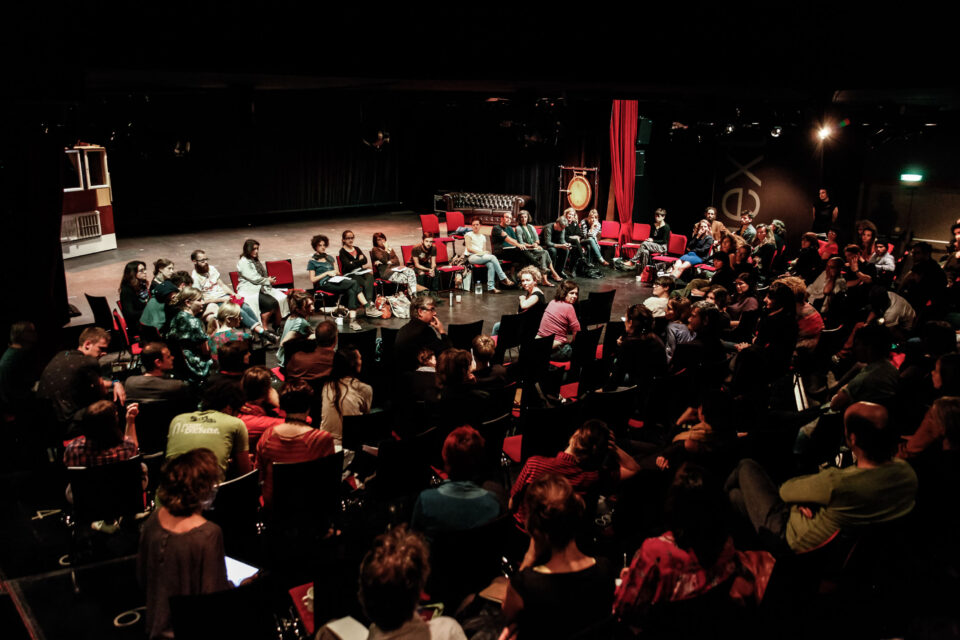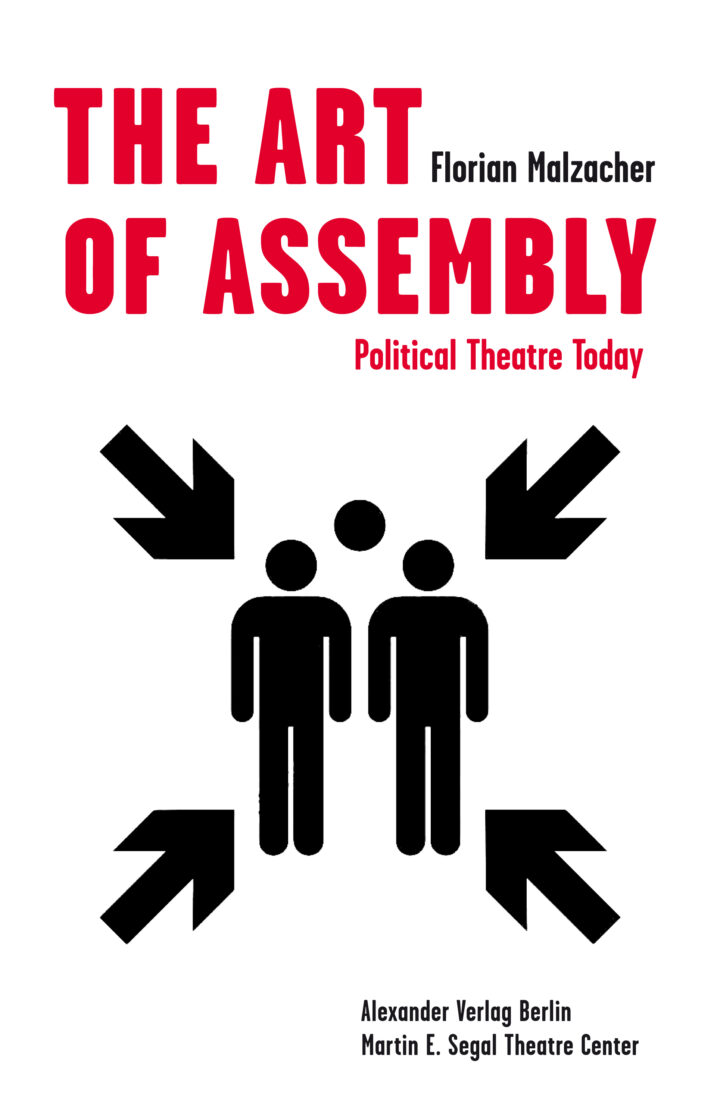So, wasn’t it just a mirror or even a fulfillment of the neoliberal agenda of more and more, of extreme labor and permanent availability? Did it not just prolong the race we are struggling with in our capitalist environment? Wouldn’t it be better to slow down, to take time? Truth is Concrete aimed in the opposite direction. Taking a break was not going to help. This machine did not set a task that could be fulfilled. It could not be easily commodified, nor easily consumed. There was no right time; it wasn’t built around highlights. There were no best couple of hours to grasp it the right way. So there was actually not one marathon, but many individual ones: some shorter, some longer; some searching for depth in familiar topics, others searching for things one had no idea about yet. Having to miss out was part of having to make choices.
In this way, it was also a metaphor for political movements: spending an hour or so at Occupy Wall Street, you will talk to some people, see some tents, maybe smell some of the spirit. You come back, listen in to some committee meetings, maybe next time start talking yourself. Or you move in. All is possible, but it will give you different intensities and insights. Truth is concrete was not only interested in the intellectual intensity it produced. It was also interested in physical intensity. In the impact this meeting had on our bodies. In the here and now.
The machinic and rigid marathon running in the centre was surrounded by a camp-like living and working environment developed by raumlaborberlin—a social space with its own needs and timings, creating a one week community, mixing day and night, developing its own jetlag toward the outside world.
The vertical gesture of the marathon machine was embedded in a horizontal structure of openness: with organized one day workshops and several durational projects and an exhibition, but most importantly with the parallel “Open marathon” based on self-organization: its contents were produced entirely by participants spontaneously stepping into the slots
So was this all just too much? Maybe. But maybe we still don’t have time to waste. The world keeps changing at a fast pace and the marathon was most of all a work meeting—an extreme effort at a time that still seems to need extreme efforts.
truthisconcrete.org (@ WebArchive)
With Hans Abbing, Milan Adamčiak, Udi Aloni, Valery Alzaga, Ulf Aminde, Burak Arikan, ArtLeaks, Awesome Tapes From Africa, Babi Badalov, Zdenka Badovinac, Zbynék Baladrán, Anette Baldauf, Katherine Ball, Stéphane Bérard, Ellen Blumenstein / Haben und Brauchen, Katya Bondarenko / Teatr.doc, Leah Borromeo, Jakob Braeuer, Christoph Braun, Reinhard Braun, Ondrej Buddeus, Loulou Chérinet, Chimurenga, Carlos Celdran, Center for Political Beauty, common spring collective, Luigi Coppola, Critical Practice, Minerva Cuevas, Sibylle Dahrendorf, Eyal Danon, Diedrich Diederichsen, Jens Dietrich / IIMP – International Institute of Political Murder, Annie Dorsen, eclectic electric collective, Róza El-Hassan, Rana El Nemr, Oriana Eliçabe / Enmedio Collective, Shady El Noshokaty, Köken Ergun, Charles Esche, Tim Etchells, Everday Rebellion, Marcelo Expósito, Eleonora Fabião, Nick Farr, Femen, Joanna Figiel, Noah Fischer, Dirk Fleischmann, Davis Freeman, Isabelle Fremeaux / The Laboratory of Insurrectionary Imagination, Fun-Da-Mental, Alexandra Galkina, Loreto Garín Guzmán / Etcétera…, Vjekoslav Gašparović / pulska grupa, Federico Geller, Mariam Ghani, Adrienne Goehler, Jennifer González, Julieta Gonzalez, Janna Graham / Ultra-red, Hafiz, The Haircut Before The Party, Gary Hall, Christian Hanussek, Paul Harfleet, Stefano Harney, Vít Havranek, Adrian Heathfield, Carl Hegemann, Herr Bogensberger, Stefan Hertmans, Pia Hierzegger, Herwig G. Hoeller, Edgar Honetschläger, Sam Hopkins, Hor 29 Novembar, Khaled Hourani, Hector Huerga, Iconoclasistas, The Israeli Center for Digital Art in Holon, Irwin, Janez Janša, Khaled Jarrar, Anna Jermolaewa, Jeudi Noir, John Jordan, Kaddu Yaraax, Don Karl aka Stone, Kavecs, Jerry Killick, Jisun Kim, Guido Kleene, Dmytri Kleiner / Telekommunisten, Nikolai Klimeniouk, Bettina Knaup, The Kominas, Michał Kozłowski, Omer Krieger, Leo Kühberger, André Lepecki, André Éric Letourneau, Lexxus Légal, Lawrence Liang, Miguel López, Sri Louise, Matteo Lucchetti, Lucifer / Church of Kopimism, Make, Mapa Teatro, Oliver Marchart, Leónidas Martín / Enmedio Collective, Masala Brass Kollektiv, Joana Mazza / Observatório de Favelas, Tomislav Medak, Kerstin Meyer, Antanas Mockus, Moddi, Maryam Mohammadi, Mao Mollona, monochrom, Carlos Motta, Chantal Mouffe, Rabih Mroué, Michal Murin, Marina Naprushkina, Alexander Nikolic / Boem*, Mary Ocher, Jens Ohlig, Sofia Olascoaga, Nikolay Oleynikov and Dmitry Vilensky / Chto Delat, Giulia Palladini, Lia Perjovschi, Sibylle Peters, Nenad Duda Petrović, Claus Philipp, The Pinky Show, The Piracy Project, Michelangelo Pistoletto, Lisl Ponger, Srđa Popović / CANVAS, Precarious Workers Brigade, Goran Sergej Pristaš, Public Movement, Radio Helsinki, Tzortzis Rallis / Occupy London Times, Judith Raum, raumlaborberlin, Gerald Raunig, Oliver Ressler, Reverend Billy & The Church of Stop Shopping, Richard Reynolds, Ultra-red, Scott Rigby / Basekamp, Irit Rogoff, Lina Saneh, Imanuel Schipper, Florian Schneider, Thomas M. Schnölzer / VolXküche feat. die Pastinaken, Judith Schwentner, Marco Scotini / Disobedience Archive, Ruti Sela, Salma Shamel / Mosireen, Urok Shirhan Alsaedy, Gregory Sholette, Stevphen Shukaitis / Minor Compositions, Amund Sjølie Sveen, Anders Smebye, Joost Smiers, Laila Soliman, Petr Šourek / CorruptTour, Janek Sowa / Free Slow University Warsaw, Jonas Staal, Ana Džokić & Marc Neelen / STEALTH.unlimited, Nora Sternfeld, Kuba Szreder, Xu Tan, Theater im Bahnhof, Bert Theis, Slaven Tolj, Aseem Trivedi, Don Tshibanda, Klumzy Tung, the vacuum cleaner, Wolfgang Vacarescu, Nicoline van Harskamp, Marina Vishmidt, Voina, W.A.G.E., Klaus Walter, Joanna Warsza, Dave Watts, Hans Winkler, WochenKlausur, Stephen Wright, Salam Yousry, Stephen Zepke, Michael Zinganel, Federico Zukerfeld / Etcétera et al.




